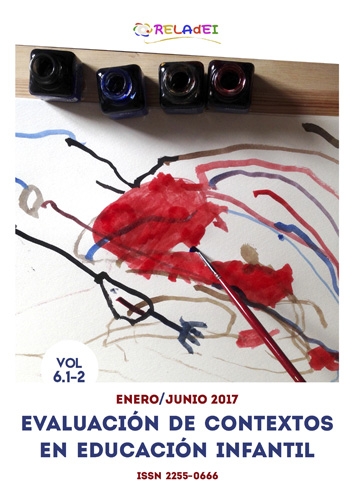Vol 6 No 1-2 (2017): Evaluación de contextos en educación infantil, Monográfico/Tema del mes, pages 61-70
Submitted: 12-03-2018
Accepted: 12-03-2018
Published: 14-03-2018
This work presents the trajectory of the research developed in Florianópolis (SC), between 2013 and 2015, in an institution of Early Childhood Education belonging to the City’s Public Education. This course is part of a more extensive research entitled “Network formation in Early Childhood Education: Context Assessment - Phase I”, coordinated by UFPR in partnership with and funded by the Ministry of Education. The basic principles were the participation, negotiation and dialogue of all involved. The goals of the research were: to use two Italian scales of context evaluation (ISQUEN and AVSI) in nursery and preschool classes, in order to observe their appropriateness for use in the Brazilian institutions of Early Childhood Education context; and to analyze the potential of using the Italian scales of context evaluation in Early Childhood Education. The methodology used mobilized a debate among the professionals working in the institution. It was a real listening exercise as the analysis of the instruments referred to the discussion on quality. It was of a non-abstract quality, but referenced in the items and criteria presented by the instruments and, as it were, resulted in reflections and exchanges of contextualized points of view. Thus, the course of the research, the discussions that were raised about the context of Early Childhood Education and its specificities were of great value for the formative process in an individual way for each participant and for the institution as a professional staff that focuses on reaching an increasingly collective and quality work. Another contribution was the construction of proficient dialogues between researchers and teachers participating in the research. These moments were permeated by exchanges, understandings and also divergences and complicity, always assuming an ethical commitment in the treatment of the information and course of the research. The instruments have proved fertile to promote productive dialogue, exchange and sharing, which at times have been permeated by divergent tensions and points of view. Thus, we could verify the pertinence of the instrument to assess the Brazilian context, as well as the methodology proposed by the Italian researchers (Bondiolli & Savio, 2013), and so we identified the formative value for the institution in general and for each professional in particular that the work developed promoted.
Childhood Education, Assessment of Context


